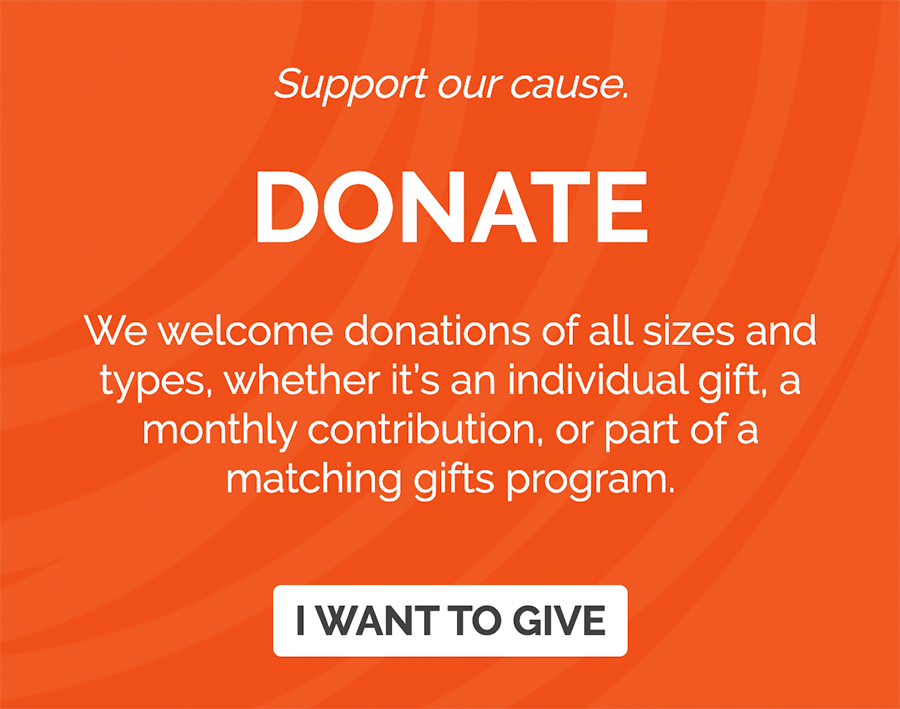By Sydney Muñoz December 16, 2022
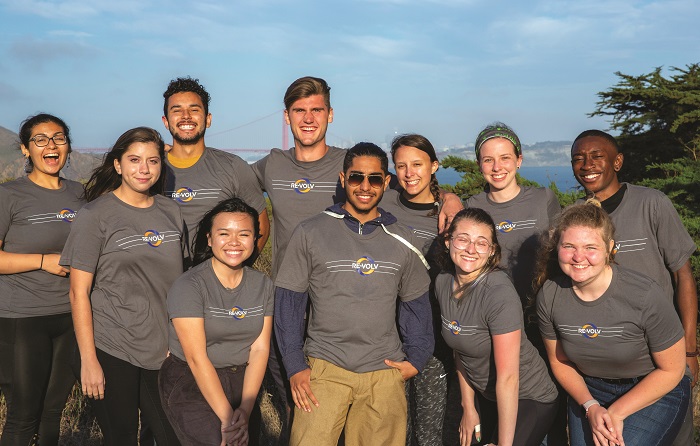
Solar Ambassador Program university team leads meet during the 2019-2020 fall training retreat. (Credit: RE-volv)
Since 2012, the solar industry has grown nearly 46%.1 With the passage of the Inflation Reduction Act this summer, the solar industry is now expected to create 550,000 new jobs, which would more than double the current industry’s workforce by 2030.2
With the rapid growth of the solar industry, there is now an even greater need for companies to hire talent with the right skills and experiences. That’s where renewable energy training programs for young professionals come into play, like the one offered by RE-volv, a Bay Area-based climate justice nonprofit.
RE-volv’s Solar Ambassador Fellowship is an academic-year-long training program where college students learn about the solar industry while helping to solarize local nonprofits. With a mission to accelerate the equitable adoption of solar energy, RE-volv provides financing via power purchase agreements and solar leases to community-serving nonprofits nationwide.
“To solve the climate crisis, people need to know that they can take action locally and that it will have a meaningful impact,” said Andreas Karelas, executive director and founder of RE-volv. “We started the Solar Ambassador Fellowship to give college students an opportunity to accelerate solar adoption, create tangible benefits for their community, and develop the necessary skills to enter the clean energy workforce.”
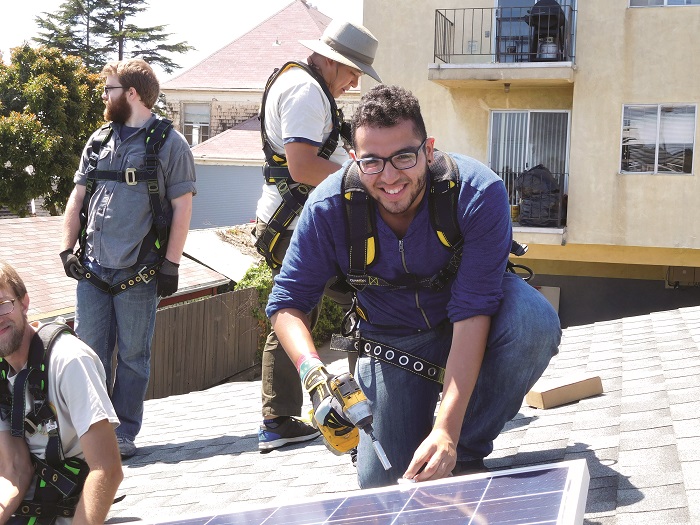
RE-volv started the Solar Ambassador Fellowship in 2014 with five universities and seven ambassadors. The program has continued to grow every year. RE-volv is currently training 100 college students at more than a dozen universities in nine states. Many ambassadors continue in the program for multiple years. More than a third of participating students rejoin the program for two or more years.
Since 2014, RE-volv has trained over 450 college students at more than 45 universities across the country, from South Carolina, Wisconsin and Ohio to Indiana, Maine and California. The Solar Ambassador fellowship has a more than 70% team retention rate, with university teams participating in the program for two or more academic years.
Alumni of the program have gone on to careers at national energy laboratories, electric utilities, government agencies, clean energy nonprofits, and industry leaders including Sunrun, Tesla, Mosaic, 3Degrees, Philadelphia Energy Authority, RMI and more.
Kickstarting Solar Careers
The fellowship runs from September to May. At the start of the program, the RE-volv team speaks with each ambassador to learn about their motivation for joining. The majority of ambassadors major in engineering or sustainability, but there’s a wide range of majors from communications to business to policy. All are looking for ways to gain hands-on experience in the solar industry while making a positive impact in their communities.
Within the solar industry, there’s a plethora of job opportunities and roles to fill outside of technical positions; everything from communications, marketing and advocacy to community engagement, project management and solar sales. Many of these soft skills can only be gained through experience typically found outside the university classroom.
Many solar ambassadors join the fellowship because they want to pursue careers in climate solutions but are not quite sure where their skills and interests align with professional opportunities.
Michelle Le, an alumna of the program, said, “Prior to the fellowship, I knew very little about the clean energy industry aside from what I could learn from my classes. I had the misconception that I couldn’t pursue a career in clean energy because I didn’t have a rigorous STEM background. This fellowship opened my eyes to so many other opportunities and gave me the space to see where I fit into all of this.”
The Solar Ambassador Fellowship Curriculum
The fellowship includes a combination of industry-specific education and hands-on experience. Through the curriculum, RE-volv educates students about solar energy technology, policy and finance, along with communications, management and leadership skills. RE-volv provides an intensive Leadership Summit training at the start of the program along with monthly webinars with industry leaders.
The fellowship focuses on two main areas: helping a nonprofit go solar and educating the community about clean energy. Solar ambassadors gain project management experience and communication skills by leading nonprofits through the solar customer journey from initial outreach to proposal review to deal closure.
After the nonprofit’s solar system is installed, the solar ambassador team works with the nonprofit to create and execute a campaign to educate the nonprofit’s community about solar through events and engagement.
The solar ambassador team hosts a ribbon-cutting ceremony for the nonprofit once the system is installed, which typically attracts local news stations to highlight the story.
Solar-Education Events Nationwide
Each ambassador team also leads three or more events per year with the goal of educating the community about the importance of renewable energy. During the 2021-2022 academic year, solar ambassador teams hosted more than two dozen events, educating more than 450 students and community members about solar through educational panels, film screenings, tabling events and advocacy work.
Last year, solar ambassadors at the University of California San Diego participated in the L.A. solar rally to protect net metering in California. Ambassadors at the University of California, Berkeley brought a solar panel on campus to educate students. The solar ambassadors at Gonzaga University in Washington ran a campaign to encourage students in the residence halls to reduce their electricity usage.
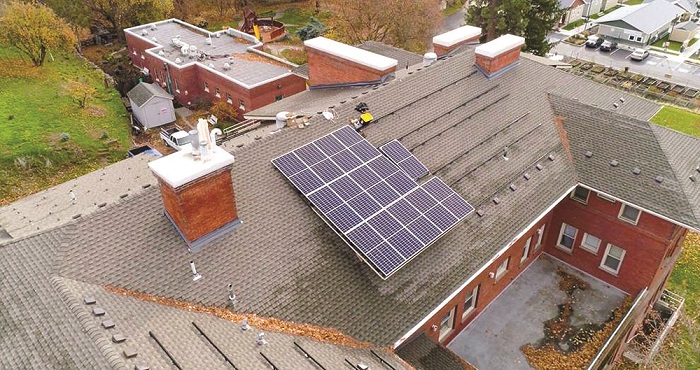
In the spring of 2022, the University of Dayton Solar Ambassador Team hosted a solar-education event as a part of a youth summer camp series led by the Mission of Mary Cooperative, a nonprofit focused on transforming vacant lots in Dayton into vegetable gardens. The Dayton solar ambassadors helped bring an 11-kW solar system to the cooperative in 2018 and have hosted many solar-education events.
Collaboration with Nonprofits
One of the key pillars of the program is the work that ambassador teams do to help solarize a nonprofit. An ambassador team takes the lead on the project by finding a deserving community-serving nonprofit that could benefit from solar energy, walking staff through the process to go solar, co-presenting the solar proposal and organizing a campaign to educate the community.
Our solar ambassadors have brought solar to 22 nonprofits nationwide in eight states. Projects include Transitions in Washington State, River Revitalization Foundation in Milwaukee, and The Village of Arts and Humanities in Philadelphia.
Coastal Carolina University has been involved in the program since 2016 and has brought solar to two Veterans of Foreign Wars posts in South Carolina. The VFW Post 10804 in Little River was the first post in the state to go solar and one of the first in the nation.
After the success of the first VFW solar project, Danielle Kvadas, solar ambassador from 2018-2021, helped bring solar to VFW Post 10420, the second nonprofit Coastal Carolina Solar Ambassadors solarized. Kvadas said, “The most memorable part of the project was the [Solar] Ribbon Cutting Event because the community was so involved and we had a great turnout. It was great to see everybody come together for solar.”3
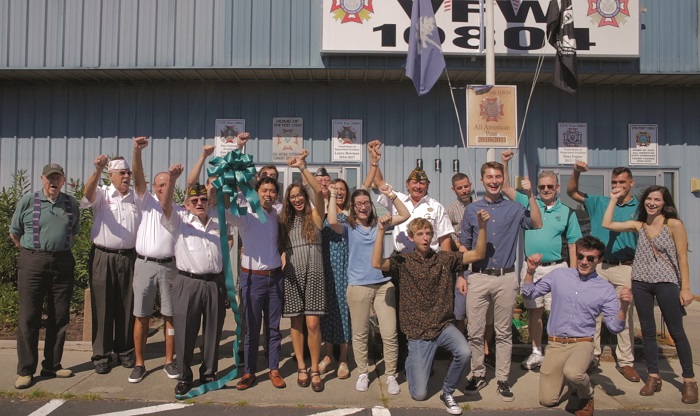
After graduating, Kvadas became the solar design and procurement manager for a solar company in Montana. “Being a RE-volv solar ambassador gives me a sense of leadership that is important when advancing my career,” she said. “I have learned accountability, the push to complete a project from start to finish, and a better grasp on handling any challenges thrown my way.”
Solar ambassadors at the University of Dayton have been involved since the program launched in 2014. The team has brought solar to three nonprofits, Mission of Mary Cooperative; East End Community Services; and Oak Tree Corner, a grief support center for children. The team celebrated the Oak Tree Corner project with a ribbon-cutting ceremony in 2021.
Patrick Hoody, a current University of Dayton solar ambassador who’s been involved in the program since 2019, said, “Working with Oak Tree Corner has allowed me to see the impact of helping nonprofits go solar. It feels amazing to be able to work towards an awesome achievement of going solar with people who care so much about the community I live in.”4
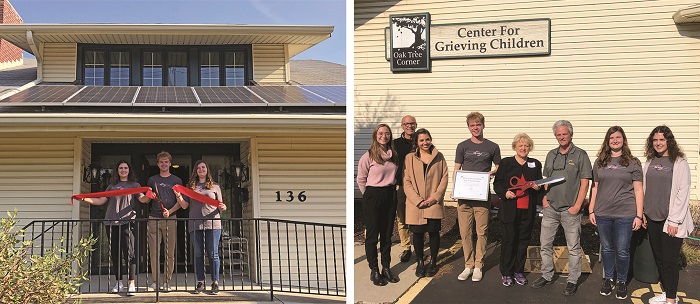
Career and Job Placement
During the 2021-2022 academic year, over 90% of RE-volv solar ambassadors reported that they are either considering or planning on pursuing a career in renewable energy following graduation. Among alumni survey respondents, over two-thirds of program graduates have found jobs in the clean energy sector. Many ambassadors receive job offers in the clean energy space as they graduate college.
Anna Adamsson was a solar ambassador throughout her undergraduate years at Purdue University from 2017-2021, where she served as team lead during her senior year in 2021. Following graduation, Adamsson started her career as a project assistant at the Clean Energy States Alliance, where she works on the Solar with Justice project and the Energy Storage Technology Advancement Partnership.
“Coming to college, I knew I wanted to study the environment and find a career path where I could be fighting the climate crisis, but I never really connected renewable energy with that,” Adamsson said. “[The Solar Ambassador Fellowship] was an invaluable experience and I learned many skills that I was able to work on and develop through the fellowship and that now I’ve been able to translate into my current role.”5
With the program providing both solar education and project management experience, solar ambassadors are more competitive when applying for their first positions after college due to the hands-on experience they gained during the fellowship.
Cat Sweeney, a solar ambassador at Coastal Carolina University from 2016-2018 who helped bring solar to VFW Post 10804, co-presented at the annual Association for the Advancement of Sustainability in Higher Education conference about the impact of the program.
“There are many opportunities and experiences that I would have never been able to experience without this program,” Sweeney said. “It definitely helped me start being a leader in the field and more specifically with the company I found employment with after college in the energy field.”6
Tyler Vallejos, solar ambassador alumni and team lead at the University of California Santa Cruz, also launched his career in the solar industry after graduation. He said, “I truly believe my experience as a solar ambassador is what landed me a job at one of the largest energy installers in the nation, Tesla Energy, and my current role supporting the leading global solar-design software built for solar installers, OpenSolar.”
“I can’t emphasize enough how beneficial the RE-volv network is for young professionals to launch their careers in sustainability,” Vallejos said. “With the knowledge I gained, I was able to leverage my experience and passion for working in clean energy to distinguish myself as a candidate who is highly knowledgeable in the industry.”
Training the First High School Ambassadors
The ambassador program is constantly evolving and changing to meet the needs of student participants and the industry. Over the years, RE-volv has trained more than just college students; working professionals as well as altruistic retirees have gone through the program as well.
This past fall, RE-volv welcomed its first dozen high school solar ambassadors from Georgia, Wisconsin and California. These students are eager to learn more about solar energy — a topic typically not taught in high school — and are ready to make a positive impact in their communities. The team is hopeful their participation will make them top candidates for university admissions.
Continuous Improvement
Throughout the last nine years, the Solar Ambassador Fellowship has evolved and grown to fit the needs of students and the industry. Feedback from solar ambassadors has always been the most important tool to improve and grow the program.
Since the fellowship runs during the academic school year, the summer months are when staff focus on recruiting new teams and students and making updates to the program. Some of the largest changes over the years have included digitizing the training, creating a Certificate of Completion, and establishing an ongoing job pipeline to clean energy companies.
In the early years, the onboarding Leadership Summit was done in person and the fundamentals of the program were taught through webinar lectures throughout the year. Now, through education software, staff have been able to develop a rigorous online course for fellows to complete at the onset that includes video presentations and digital readings, exercises and quizzes.
In 2021, the team introduced the Certificate of Completion to highlight solar ambassadors who have successfully completed the requirements of the program. RE-volv has certain requirements for teams and individuals to guide the work of the solar ambassadors, including attending educational trainings, hosting solar-education events and collecting relevant information from nonprofits.
The Certificate of Completion allows the solar ambassadors to showcase their achievements in the program on their resumes and LinkedIn profiles, while demonstrating to potential employers their skills and real-world experience.
As the needs of the solar energy workforce continue to grow, RE-volv is excited to play its part in creating career pathways into the industry, training the next generation of clean energy leaders.
Sources
- https://tinyurl.com/msk36k7s
- https://tinyurl.com/yck2v3r3
- https://tinyurl.com/mr45726e
- https://tinyurl.com/2p8c5wcw
- https://tinyurl.com/28uh4n2m
- https://tinyurl.com/bddv5y6n
About the Author
Sydney Muñoz served as the Community Engagement Coordinator at RE-volv from 2020-2022, where she managed the Solar Ambassador Program for two years. She is currently the Sustainability Specialist for Goodwill Industries International. She has more than four years of experience leading projects, programs and initiatives on sustainability, clean energy, waste reduction and alternative transportation within nonprofit, university and government spaces. Sydney also serves on the American Solar Energy Society Board of Directors.





